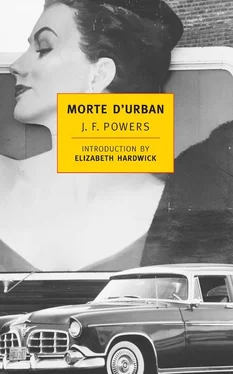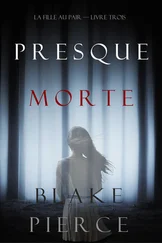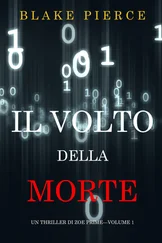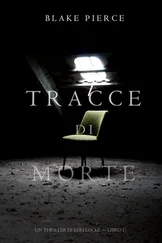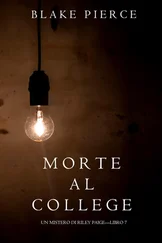“Not then. I did earlier.” Perhaps Brother Harold’s only fault, in Wilf’s view, was that he used his mixer too much.
“And disconnected it?”
“Yes, Father.”
“And the TV wasn’t on,” Wilf said.
“I may be at fault,” said another voice. “I left an electric heater on in my room.”
“I didn’t know you had an electric heater, Father.”
“I left it on to take the chill off my room. I plan to spend the evening there. I’ve got some letters to write.”
From out of the darkness: “ I didn’t know you had an electric heater, Father .”
“Monsignor Renton was kind enough to lend me one. It gets pretty cold in my room, you know.”
“I hope you didn’t tell him that, Father.”
“As a matter of fact, I did.”
“I wish you hadn’t, Father.”
“God knows it’s the truth.”
“If that gets around, it could keep retreatants away. Flash-light, Brother.” Wilf ordered Brother Harold to take a candle from the kitchen and to go and stand by the fusebox in the corridor. Then Wilf moved off silently, carrying the dim flashlight, and Father Urban followed him. Jack sat on at the table, in the dark.
Upstairs, Father Urban stood by the door of his room, as ordered, while Wilf went inside and disconnected the heater.
“Tell Brother it’s O.K. now.”
Father Urban sang out that it was O.K.
Wilf was moving toward the floor lamp when it came on. “Left that burning, too.”
“ That I forgot.”
Wilf knelt to examine the little plate on the heater. “No wonder! Thirteen hundred and twenty on low and sixteen hundred and fifty on high — and you had it on high! You trying to burn the house down, Father?”
“You know what I was trying to do, Father.”
“You only sleep here, Father.”
“I’d like to be able to do more. I’d like to able to sit down and read and write in something like comfort.”
“Well, you won’t wear long underwear,” Wilf said, going over to the register. He knew better than to feel it. “What’s wrong with downstairs? The refectory’s always nice and warm.”
“It isn’t suitable.”
“Well, I don’t have to tell you this circuit won’t take this heater.”
“And wasn’t suitable even before we got television.”
Wilf looked old . “I’ll take another look at your duct,” he said, and quickly departed.
He could be heard down in the bowels of the house, tampering with the furnace, but when the heat came on again, it was, as usual, not for long, and more ebb than flow. When the temperature dropped to normal in his room, as it soon did, Father Urban put aside his breviary and went to bed. By not going downstairs to television, he hoped to keep the pressure on Wilf. He hadn’t meant that they should give up television and turn the one cozy room into a study. That, though, was what Wilf must have concluded — in his guilt, which was the guilt of the hooked but not yet hardened viewer — and on the high ground of that misunderstanding, Father Urban would take his stand, saying nothing, letting his actions speak.
The next evening, however, when he might have been home in bed keeping the pressure on Wilf, Father Urban was out. Early in the afternoon, a Mr Bean had called from St Paul to say that he’d be driving back to Great Plains that day and would like to pick up Father Urban on the way and take him to dinner — it was something he’d been wanting to do for some time. “O.K., if that’s how it is,” said Father Urban, assuming that they’d met somewhere.
Apparently, though, Mr Bean was just one of those people who had heard him — whether at St Monica’s on Sundays, or at the Poinsettia Smorgasbord, Father Urban didn’t know or bother to ask. They drove on to Great Plains, with Mr Bean, a weedy little man with a bass voice, doing all the talking. He was in outdoor advertising, and, for the last few days, he and his cohorts had been preparing for the battle soon to take place between them and the anti-billboard lobby in the state legislature. Mr Bean was full of it. “I still don’t know where you stand, Father,” he said, when they pulled into the parking lot of the General Diggles Hotel, where they were to eat. “Nor do I,” said Father Urban, getting out of the car. This was the kind of controversy he liked to steer clear of — he could meet somebody on the other side tomorrow.
Nothing had been said about Mrs Bean, but there she was, waiting for them in the Greenwich Village Room: the attractive redhead who had given Father Urban trouble at the smorgasbord. Father Urban felt trapped, felt that he had been brought there because Mrs Bean wanted another crack at him, and in the same arena, and that her husband had acted as matchmaker. But there was no mention of the earlier encounter — Mrs Bean must have assumed that she wouldn’t be remembered — and the conversation went along nicely, with everybody having a second drink and with Father Urban giving an amusing account of the hardships and misadventures of the little community at the Hill. Through it all, even in the matter of the electric heater, he covered up for Wilf (“Actually, he’s doing a bang-up job”) and was moving gradually from the ridiculous to the sublime aspects of the religious life when Mr Bean interrupted him.
“I’ve been thinking about what you said in the car, Father.”
Father Urban couldn’t recall saying anything memorable in the car. “Yes?”
“This may give you a better idea of us . The industry’s pledged the use of 12,000 highway billboards, for emergency-warning purposes. Within twenty-four hours after the declaration — the declaration that an enemy attack is imminent— we’ll have a previously prepared civil defense message up in six hundred key points around the country. Of course, we hope that day never comes, but if it does, we’ll be ready.”
“Sounds like a large order,” said Father Urban, thinking it didn’t make any sense in the space age but might throw the enemies of outdoor advertising for a slight loss.
“Oh hell, Ray!” said Mrs Bean, and went off on a tangent of her own — the persecutions taking place behind the Iron Curtain, the sufferings of “the Silent Church.” Turning on Father Urban, and referring, presumably, to his Sunday sermons at St Monica’s, she cried: “I keep hoping you’ll say something about that ! But you never do!”
“We don’t know how lucky we are,” Father Urban said, trying to calm her down, but somehow sounding guilty — like the slacker she evidently believed him to be.
“Then say that !” cried Mrs Bean. “Oh, say something !”
“We follow a regular course of sermons in this diocese. At present we’re going through the sacraments, and that’s what I have to talk about.”
“You could still say something ! Others do , you know.”
Obviously, Mrs Bean’s mind had been conditioned, if not impaired, by reading the Catholic press, and she may have had one more than was good for her, too. What else? Her husband couldn’t handle her — that was all too clear — and there were no children from their union to knock the starch out of her. Father Urban wondered if he could be making a mistake in being gentle with her. He had let her have it at the smorgasbord because there had been no other way, but perhaps it was the only way to handle her. She had asked him earlier if he ever read the Drover , and he had evaded the question, but when she asked him again, he said:
“It’s too rich for my blood.”
“Would you read it if I had it sent to you?”
“No.” The Drover , a weekly, had begun as a paper for the livestock trade, but it was now — and unfortunately had been for the last thirty years — wandering in the wilderness of religion and politics, keeping the old name, and doubtless a few old subscribers, and adding crooks and crosiers to the masthead where longhorns had been before. In no other paper would you find everything that was wrong with the Catholic press. The Drover had it all, all the worst features of the bully and the martyr. Why anybody — any educated person, even one who didn’t like the way the world was going — would want to read the Drover , Father Urban didn’t know.
Читать дальше
